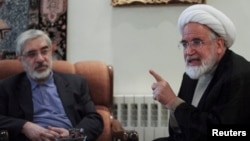Recent reports highlight the continuing dire human rights situation in Iran. Ongoing abuses reveal how challenging it will be for Iranian President Hassan Rouhani to live up to campaign promises to improve the human rights situation there.
Since President Rouhani’s re-election in May, the Center for Human Rights in Iran reports that eight political and civil rights activists have been given prison sentences of up to four years for allegedly reading and spreading feminist literature in Iran; Baha’i student Farzad Safaei was expelled one semester away from completing his bachelor’s degree at the Islamic Azad University because the University discovered he was a Baha’i; on the day human rights defender and Baha’i rights activist Navid Khanjani was to be released from prison, he was told he must serve an additional year for another purported crime.
And the two former presidential candidates, Mehdi Karroubi and Mir-Hossein Mousavi, as well as Mousavi’s wife Zahra Rahnavard, remain under house arrest, despite President Rouhani’s statements that they should be released.
U.S. Acting Assistant Secretary in the Bureau of Democracy, Human Rights and Labor Virginia Bennett said recently that the United States is determined to apply pressure on the Iranian government “to protect the…fundamental freedoms of the Iranian people:”
"We continue to promote human rights in Iran in a wide variety of ways, in particular, I would recall our [State Department’s] Acting Spokesperson statement on February 14th calling for the release of Mehdi Karroubi, Mir Hossein Mousavi, and Zahra Rahnavard.”
She also noted that the United States has repeatedly called on the government of Iran to release all prisoners of conscience, including the imprisoned members and leaders of Iran’s Baha’i community:
“Freedom of belief is a fundamental human right. Continued imprisonment, as well as the abuse that they sustain while they are imprisoned, really crosses a line that I think is very important to the United States.”
Acting Assistant Secretary Bennett said, “We are going to continue to hold Iran accountable for its serious human rights abuses.”
As Secretary of State Rex Tillerson stated in his remarks on the re-election of President Rouhani, the United States “hopes that he restores the rights of Iranians to freedom of speech, to freedom of organization [assembly], so that Iranians can live the life that they deserve.”














